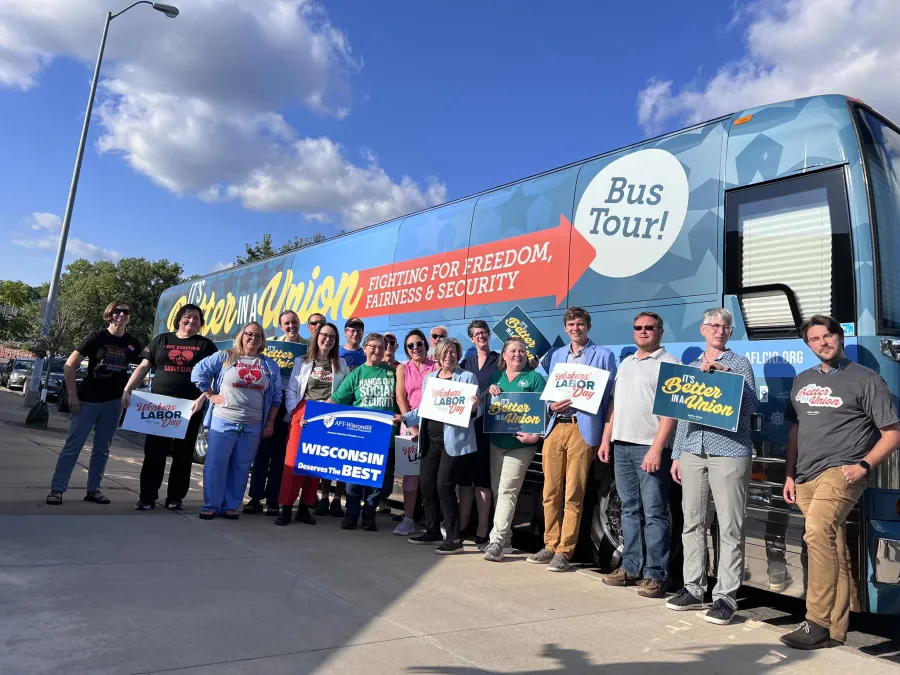Workers’ Labor Day

Happy Labor Day!
We hope you celebrate with brothers and sisters at great union Labor Day events around the state.
Here’s the Wisconsin AFL-CIO 2025 Labor Day message that was published this morning on-line in the Milwaukee Journal Sentinel.
AFL-CIO “It’s Better in a Union” Bus tour in Eau Claire on August 27, 2025
As the old saying goes, “the more things change, the more they stay the same.” It’s an apt observation for many situations. Labor Day is a good time to reflect on how it applies to the world of work in 21st century America.
Much has been written about the unprecedented impact things like artificial intelligence and the so-called gig economy are having on the relationship between workers and our employers. While the modalities of work may indeed change, there is an underlying dynamic which remains constant: the boss’s desire to get the most possible labor from the fewest possible workers for the least possible compensation. This is the immutable reality for most employees; whether we work in a factory, in a hospital or behind the wheel as an app-based delivery driver, we are part of what is perceived in the boardroom as a zero-sum game in which anything we earn is seen as negatively impacting the bottom line.
Power in our society goes to two poles: to those who have the money and those who have the people. Since the 1980’s, wealth in America has become increasingly concentrated at the top. According to the Congressional Budget Office, as of 2024, the top ten percent of U.S. households controls 70% of the nation’s wealth, while the entire bottom half holds just three percent.
Clearly, for the vast majority of workers, the power to shape our working lives will not come from our generational wealth. But by standing together in unions, working people build the power to have a seat at the table. That’s good news not only for union members, but for society in general. As John F. Kennedy observed, “Our labor unions are not narrow, self-seeking groups. They have raised wages, shortened hours and provided benefits. Through collective bargaining and grievance procedures, unions have brought justice and democracy to the workplace.”
In addition to expanding economic benefits for all workers, labor unions also increase overall political participation. While research shows that union members are more likely to vote and participate in politics, union efforts to educate and mobilize voters also increase participation among nonmembers. Simply put, unions are good for democracy.
Despite public support for labor unions currently reaching levels not seen in decades, particularly among younger workers, efforts to undermine unions and union organizing continue. Donald Trump’s March 27th executive order stripping collective bargaining rights from one million federal workers was the biggest single act of union busting in U.S. history. Federal agencies like the National Labor Relations Board and the Occupational Safety and Health Administration charged with protecting workers’ right to organize and ensuring safe workplaces have been similarly compromised.
A more subtle assault on organized labor comes from those seeking to use new technologies and changing ways of working to undermine workers’ rights. The New York Times reports that in the near future, nearly half of all jobs will be exposed to some form of AI automation that will disrupt and displace workers. Labor unions do not oppose AI, but rather seek to protect workers’ job quality, safety and rights by being involved in the design and deployment of this transformative technology.
Similarly, changing ways of working should not be used to roll back hard-won worker protections. A recent example here in Wisconsin is the attempt to misclassify workers for app-based companies like DoorDash and Uber as independent contractors instead of employees, permanently stripping them of important rights like minimum wage, overtime, unemployment benefits and workers’ compensation. A look at the corporate ownership of these companies suggests that these modern innovations are being used in support of an age-old effort to prioritize the interests of shareholders over workers. The more things change, the more they indeed stay the same.
The importance to our nation of preserving the rights of workers was eloquently stated by a prominent Republican politician, who said, “All that serves labor serves the nation. All that harms labor is treason. If a man tells you he loves America, yet he hates labor, he is a liar. There is no America without labor.” His name was Abraham Lincoln.
In Solidarity,
Stephanie Bloomingdale
